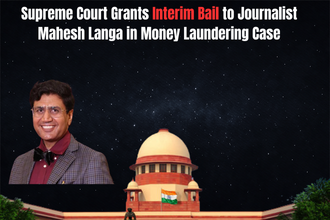In a notable ruling on the misuse of criminal law in matrimonial disputes, the Supreme Court of India has quashed a First Information Report (FIR) filed by a woman who alleged that her husband had misrepresented himself as an eye surgeon to induce her into marriage. The judgment in Rohan & Ors v. State of Gujarat & Ors, delivered on May 7, 2025, reaffirms the judiciary’s commitment to preventing the abuse of legal process under the garb of matrimonial complaints.
Background: The Marriage and the Allegations
The couple in question got married in April 2023. However, a few months into the marriage, the woman lodged a police complaint accusing her husband and his family members of fraud and deception. According to the FIR, the husband had allegedly claimed to be a qualified eye surgeon. After marriage, the complainant discovered he was actually an optometrist. Furthermore, she also alleged that he concealed a visible skin condition (leukoderma) from her at the time of marriage.
The case was dismissed at the trial court but upheld by the Gujarat High Court, prompting the husband and his family to approach the Supreme Court for relief.
Supreme Court’s Observations: No Deception, No Crime
A Bench of Justices Sudhanshu Dhulia and K Vinod Chandran examined the material placed before the Court, including WhatsApp chats between the couple, and found no evidence to support the claim that the woman had been misled.
“From all reasonable assumptions as well as the documents which have been placed before us, it is clear that the complainant had full knowledge that the appellant was suffering from skin disease and he was not an Eye Surgeon but an Optometrist,” the Court noted.
The Court clarified that the communication between the couple prior to their marriage clearly showed that the husband had not attempted to disguise his medical condition or qualifications. Therefore, the FIR did not reveal any prima facie criminal offence and amounted to a misuse of legal provisions to harass the husband and his family.
Legal Implications: When FIR Becomes Abuse of Process
The Supreme Court invoked its inherent powers under Section 482 of the Code of Criminal Procedure (CrPC) to quash the FIR. This section empowers the Court to prevent abuse of legal process and secure the ends of justice. The judgment reiterated that the criminal justice system should not be used to settle personal scores in failed marriages, particularly when the allegations do not meet the threshold for criminal prosecution.
Importantly, the Court did not condone misrepresentation in matrimonial alliances. However, it clarified that every disagreement or dissatisfaction in marriage does not give rise to a criminal offence unless it involves deliberate fraud or concealment of material facts.
Key Legal Takeaways from the Judgment
- Distinction Between Misunderstanding and Criminal Misrepresentation
Not every case of marital disappointment constitutes criminal cheating. The Court recognized the need to distinguish subjective discontent from deliberate deception punishable under law. - Role of Pre-marital Communication
The Court emphasized the importance of electronic communication records, like WhatsApp chats, as reliable evidence in determining the true nature of consent and disclosure before marriage. - Abuse of Criminal Law in Matrimonial Disputes
The judgment contributes to a growing body of jurisprudence discouraging the misuse of criminal law by aggrieved spouses in domestic disputes. It follows previous rulings where courts have cautioned against weaponizing legal provisions such as Section 498A IPC (cruelty by husband and relatives) and Section 420 IPC (cheating) in the absence of solid evidence. - Inherent Powers of High Courts and Supreme Court
The ruling is a reminder that Section 482 CrPC exists as a safeguard to quash frivolous or vexatious complaints that fail to disclose an offence.
Advocates and Representation
The appellants were represented by AoR Somesh Chandra Jha, along with advocates HB Shethna, Saumya Dwivedi, Akash Kishore, and Animesh Rajo. The respondents were represented by Senior Advocate Purvish Jitendra Malkan, assisted by a team of advocates including Dharita Malkan, Alok Kumar, Kush Goel, Khushboo Aakash Sheth, Swati Ghildiyal, and Rishi Yadav.
Judicial Wisdom in Personal Law Matters
The ruling in Rohan v. State of Gujarat comes at a time when courts are increasingly being called upon to balance legal safeguards for women with checks against false or exaggerated complaints. While the judiciary has taken a firm stand against dowry-related offences and cruelty, it also recognizes that false FIRs can destroy reputations, careers, and families.
This case highlights the judiciary’s nuanced approach in preserving individual liberties, especially when no crime has actually been committed. By examining the intent behind the FIR, and the factual context, the Court ensured that criminal prosecution does not become a tool for vendetta.
Societal Impact and the Way Forward
The Supreme Court’s ruling is expected to have a deterrent effect on the filing of baseless matrimonial complaints. At the same time, it urges law enforcement agencies and lower courts to closely scrutinize FIRs that stem from personal disputes without criminal substance.
This verdict also encourages greater honesty and clarity in matrimonial alliances, with courts looking at premarital interactions as evidence of informed consent. It reminds parties to be transparent about health conditions, professional qualifications, and other relevant facts during matrimonial negotiations.
Conclusion
The Supreme Court’s decision to quash the FIR in Rohan & Ors v. State of Gujarat sends a clear message: the criminal justice system cannot be misused to settle personal grudges in matrimonial relationships. The ruling not only protects the rights of the falsely accused but also preserves the sanctity and purpose of criminal jurisprudence.
In a society where arranged marriages often involve limited courtship and limited scrutiny, this judgment promotes both accountability and legal integrity. It underscores that criminal law should only be invoked when there is a real and demonstrable offence, not as a tool for emotional retribution.


